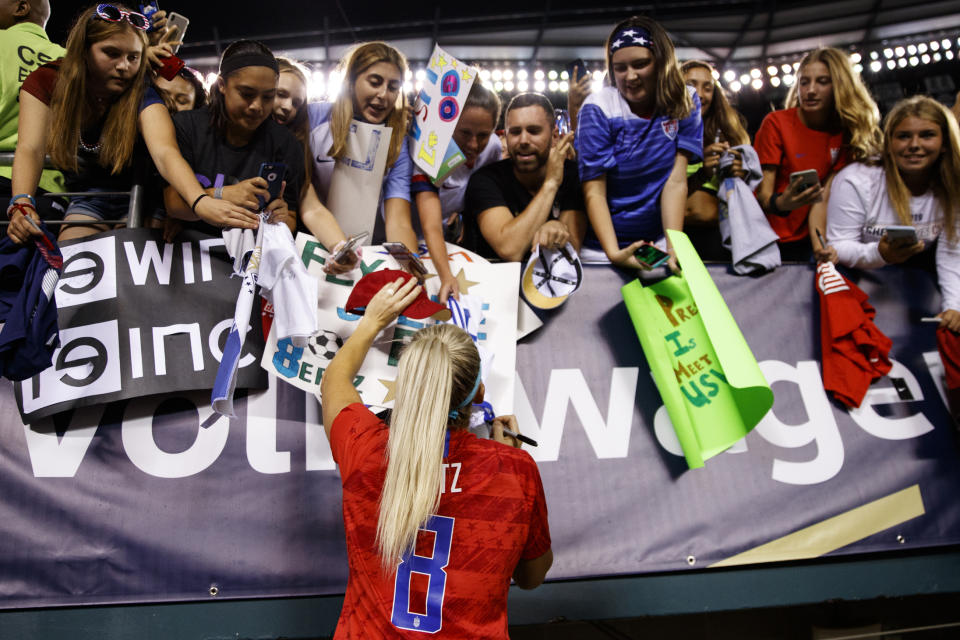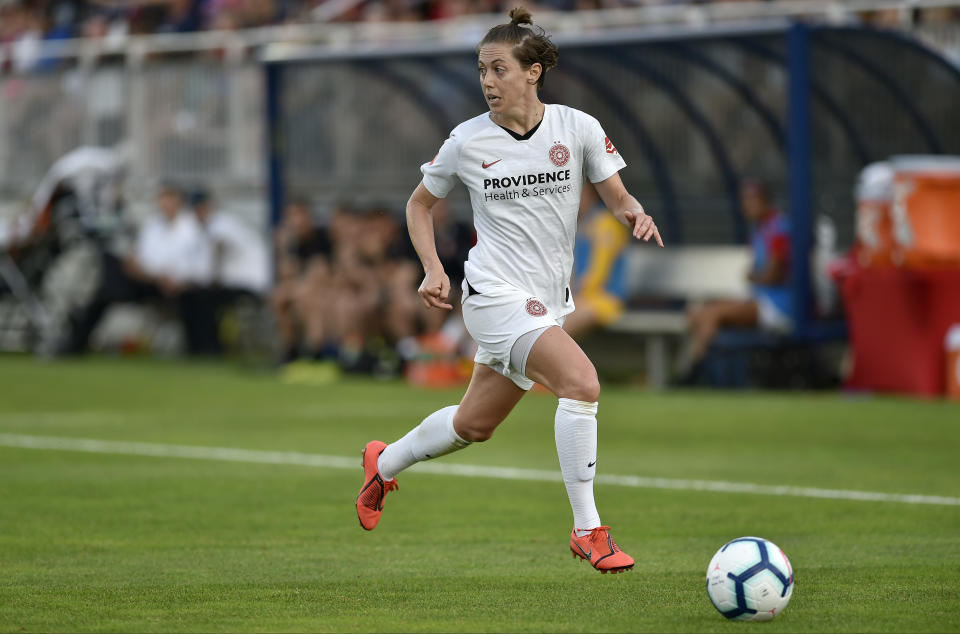How USWNT is successfully monetizing its image rights after being told they had 'no value'

Julie Ertz still has the poster saved somewhere. When she was in grade school, the U.S. women's national team came to Phoenix and, as a young soccer-playing fan, Ertz desperately wanted a memento – but the pickings were slim.
“The only thing I could leave with so I could remember that moment was a poster,” Ertz says. “It was the only thing I could have to support the team, and I was a kid wanting a T-shirt so bad.”
More than a decade later once Ertz became a member of the USWNT herself, she found not much had changed. Even after winning the World Cup in 2015, when the team was as popular as it had ever been, there was no way for the players to connect with fans and capitalize on their own success at the same time.
“So many fans would ask us, ‘How can we get this? How do we get that? How can we support you?’” Ertz says. "We didn't even have a deal to sell our own player jerseys. So many people wanted them but couldn't find them. We felt like we were marketable and people wanted product but we couldn’t get it out there.”
Since last year, however, that has been changing quickly.
Lamenting all the missed opportunities after the U.S. won the World Cup four years ago, the players fought to take back control of their own image rights in their last collective bargaining agreement with U.S. Soccer. They've been building a new business arm ever since with REP Worldwide, a brand management agency that the USWNT co-founded with players from the NFL and the WNBA.
It was easier said than done. With no track record and no existing business relationships, the USWNT Players Association set out to monetize the team's image rights for the first time.
But winning the World Cup again this summer in France sure offered a heck of a launch pad.

The USWNT Players Association now has 26 deals signed with licensees who are authorized to sell products featuring the team and its star players. Those deals represent a wide range of products, from shirts in a deal with Homage, to the covers of Wheaties boxes with General Mills, to bobbleheads with Foco.
“In 2015, the licensing revenue was $0 to the Players Association,” says Becca Roux, the director of the USWNT Players Association. “Now we're on pace for $1 million this year. That's a huge difference, but we're still barely scratching the surface. We had no sales data going into this World Cup to attract these licensees and get on the floor of these major retailers, but it has done well.”
Now, with proof that USWNT merchandise will sell since the World Cup, it's made Steven Scebelo's job a little bit easier. He is the president of REP Worldwide, which spearheads the acquisition of new licensees.
Target, one of the largest retailers in the country, featured player-specific T-shirts in stores across the country this summer via a licensing deal with Icon Sports. Through June, they sold four times their minimum guaranteed in royalties, Scebelo says, and that period doesn't even cover the World Cup final or the aftermath of the USWNT's big win. Final sales reports from July aren't ready yet.
BreakingT, which sells T-shirts in real time in response to viral moments, had its single-best day of sales during the Women's World Cup, in large part thanks to water cooler moments like Alex Morgan's tea-sipping celebration and Megan Rapinoe's iconic statuesque pose, Scebelo adds.
Nike announced during the World Cup – before the U.S. won the tournament – that the USWNT's home kit was the company's best-selling soccer jersey ever for a single season.
Even before the USWNT had lifted the trophy in Lyon, all the signs were there – this team had a market if there were companies willing to tap into it.
“The day after they won, that Monday, we followed up with people who didn't move forward earlier to see if they had second thoughts,” Scebelo says. “In one of our first calls, the person said, ‘I should've taken this license six months ago.’”
That phone call ended with that company signing on. The deal is still being finalized, but it should be announced soon, Scebelo says.
The one existing deal in place from when U.S. Soccer held the rights – with EA Sports to feature the USWNT in the popular FIFA video game franchise – has been improved upon. The deal is now for a higher fee, it's a longer-term deal and it doesn't prevent the USWNT from signing on with other video games, Scebelo adds.

For all the work that the USWNT Players Association and REP Worldwide have done building this new business, the market was probably always there – it was just an underground market. In the past, without any officially licensed merchandise available, fans ended up buying unauthorized gear because that was the only option.
But now, doing that siphons money away from the players that would otherwise come through official pipelines. Designs featuring the players on third-party marketplace websites like Amazon, Etsy and Redbubble often aren't authorized, meaning the players don't see a dime from those products.
In some cases, lawyers for REP Worldwide and the USWNT Players Association have to send cease and desist letters to sellers profiting off the players’ likenesses without permission. But other times, those sellers want to support the players and come on board as authorized merchandisers after realizing they needed to obtain a license.
It's all part of working out the kinks of a new business venture. And with the USWNT doing something it has never done before, the players have found themselves taking on new roles beyond soccer.
Meghan Klingenberg, former USWNT defender, is in touch regularly with REP Worldwide and reviews every licensing contract to make sure it’s a good fit. Samantha Mewis, central midfielder, has taken an interest in helping the USWNT Players Association function more like a business. And Ertz, a defensive midfielder, has found herself immersed in the creative side of anticipating what fans want and helping make it a reality.
She helped design T-shirts sold via Represent, and took the lead in promoting them by engaging with fans on social media.
“It’s been amazing not just being a soccer player, but being able to be a businesswoman,” Ertz says. “It’s cool to feel like you can have more control of your career in many aspects. Every player on the team is so different in the things they love to do, and each individual can branch out and connect to fans who love those things too.”
As for the new skills the players are developing off the field?
“For the younger players, that's been a fun thing for them to explore,” Ertz adds. “They can find those things they can add into their career and lead them into a path after soccer.”
[ Follow Yahoo Soccer on Twitter and Facebook ]
The licensing and sponsorship deals aren't going to take the place of the salaries the players earn from U.S. Soccer or the bonuses they get for winning games, which have become a point of contention in a lawsuit the players filed against the federation. But the players hope the business will keep growing into a major revenue stream.
Roux and the players remember that U.S. Soccer told them during contract negotiations that the team’s image rights had no value beyond what U.S. Soccer already paid the players. The USWNT disagreed – they felt U.S. Soccer paid them for playing soccer and the image rights were simply taken for granted. Now, it doesn't look like there's much of an argument.
“The success to date really validates the players’ position that there was value in those group licensing rights,” Scebelo says. “They were told there was no value, and they've proven that wrong within a year.”
The players say they have been playing catch-up to make sure the basic offerings are available to fans. Ertz wanted USWNT supporters to be able to buy the same sort of products that are available to fans of her husband, Philadelphia Eagles tight end Zach Ertz.
Next, the players want to innovate and find more products that will appeal specifically to soccer fans – like the team's existing deal with Ruffneck Scarves – or with women and girls, who make up a larger part of the USWNT’s fanbase than men’s sports teams.
The USWNT Players Association has just launched a campaign to conduct surveys and gather market research to better understand not just the demographics of USWNT fans, but also the ways fans engage with the team. That will help them decide the license deal and sponsorships that should come next.
“We want to understand our fans better,” Ertz says. “Like, ‘Hey, what do you guys want? How can we connect with you guys?’ I don't even want to put a cap on what we could do as long as it's what the fans want.”
Caitlin Murray is a contributor to Yahoo Sports and her book about the U.S. women’s national team, The National Team: The Inside Story of the Women Who Changed Soccer, is out now. Follow her on Twitter @caitlinmurr.
More from Yahoo Sports:
